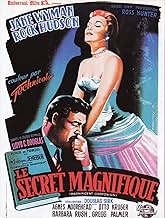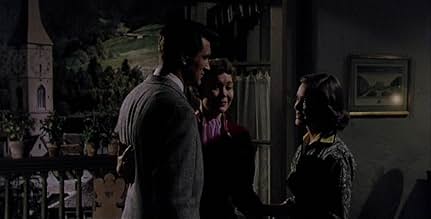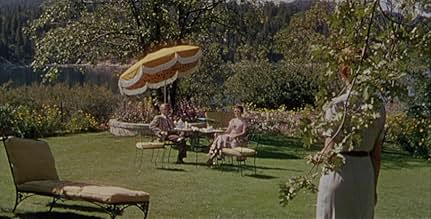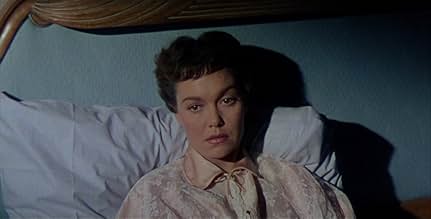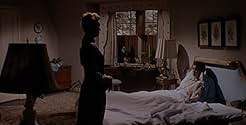CALIFICACIÓN DE IMDb
7.0/10
8.1 k
TU CALIFICACIÓN
Un rico playboy cuya imprudencia causa inadvertidamente la muerte de un prominente médico intenta enmendar su error con su viuda, y se enamora de ella en el proceso.Un rico playboy cuya imprudencia causa inadvertidamente la muerte de un prominente médico intenta enmendar su error con su viuda, y se enamora de ella en el proceso.Un rico playboy cuya imprudencia causa inadvertidamente la muerte de un prominente médico intenta enmendar su error con su viuda, y se enamora de ella en el proceso.
- Dirección
- Guionistas
- Elenco
- Nominado a 1 premio Óscar
- 2 premios ganados y 1 nominación en total
Joseph Mell
- Dan
- (as Joe Mell)
Opiniones destacadas
My unashamed love for the films of Douglas Sirk may be described as an obsession, but it is to me, of course, a magnificent obsession. My attempts to influence others as to Sirk's genius have mostly failed. He's a director whose work you either get, or not. Those who view his works as camp masterpieces are very much missing the point. What is intrinsic in works of camp is the end product being appreciated in a manner that the creator had not intended. However, every camera angle of each frame, every nuance, indeed every color in every shot is totally intentional in all of Sirk's major films.
"Magnificent Obsession" is far from Sirk's best work, but it is perhaps his most important. Though he had made films in many genres, it was "All I Desire", his 1952 melodrama that paved the way for what would become his special place in cinema history. In the often ridiculed genre of so called "woman's movies", Sirk discovered there was great scope for artistic expression as well as social criticism and much more in this apparently vacuous genre. "Magnificent Obsession" is the first film in which this vision is realised.
To understand why this happened at all one must remember that Sirk was under a long term contract with Universal throughout the fifties, when they were by all accounts an inferior studio. As an European immigrant in need of work, Sirk signed to Universal, with the full understanding of the type of projects that would be offered to him. His intellectual and rich theatrical background would be put to use in clearly inferior material. When asked about this, he gave the example of how many of Shakespeare's plots are weak and uninteresting in themselves; it's the language that makes them art. Sirk was a master of cinematic language in all its aspects. The plots of his movies are often truly abysmal, but the language always pure joy to behold. "Magnificent Obsession" is a prime example of the abyss between screenplay and the cinematic language employed.
After reading the script of "Magnificent Obsession", Sirk called the plot "crazy" and did not want to make it. But as a contracted director, he had little sway with the studio heads and was persuaded, as always, to make the movie. It should be noted that he never had a bad word to say about Universal, even after he left Hollywood. He fully understood the contract he had made and simply made the best of his situation. It should also be noted that he gave Universal some of their greatest commercial successes of the decade, and created for them a star leading man, something they were in desperate need of. That star was Rock Hudson. "Magnificent Obsession" was Hudson's breakthrough film. He made eight films together with Sirk.
The magnificent obsession in question is the quest for spirituality; not exactly high on the agenda of materialistic, picture perfect, upper class American society of the fifties. Bob Merrick (Rock Hudson) is a shallow, womanizing, heavy drinking, spoiled playboy. The movie charts his journey towards spirituality. He is guided on this path by an older intellectual artist, Edward Randolph (Otto Kruger). Many critics have noted the physical similarities between Kruger and Sirk himself. It's almost irresistible to develop this notion. It is Randolph who despite Merrick's crass behavior perceives a potential for greater things and leads him towards self fulfillment.
Similarly it was Sirk who first spotted Rock Hudson's star potential. Under his guidance and direction, Hudson would in a matter of two to three years, become one the most popular actors in Hollywood. Having worked closely on eight films, it would seem absurd that Sirk was not aware of Hudson's homosexuality. This did not deter Sirk, (who himself was not gay). Moreover it fits well with his fascination for what he termed "split characters". It's the embodiment of fifties picture perfect appearance shielding a very different reality that is central to much of Sirk's work.
Edward Randolph quietly removes himself when he realises his protégé has finally found his new self. His work is done. While Hudson was no heavyweight in the acting stakes, under Sirk's direction he gave some very respectable performances, "Magnificent Obsession" amongst his best. His post Sirk career would soon take him to Doris Day territory, a far cry from the likes of "Written on the Wind", "Tarnished Angels" and "Battle Hymn".
All of Sirk's films are worth taking a close look at, particularly from "Magnificent Obsession" onwards. There are a handful of directors who so well grasped the possibilities of film making and possessed the know how in using the many elements that make up this art form.
"Magnificent Obsession" is far from Sirk's best work, but it is perhaps his most important. Though he had made films in many genres, it was "All I Desire", his 1952 melodrama that paved the way for what would become his special place in cinema history. In the often ridiculed genre of so called "woman's movies", Sirk discovered there was great scope for artistic expression as well as social criticism and much more in this apparently vacuous genre. "Magnificent Obsession" is the first film in which this vision is realised.
To understand why this happened at all one must remember that Sirk was under a long term contract with Universal throughout the fifties, when they were by all accounts an inferior studio. As an European immigrant in need of work, Sirk signed to Universal, with the full understanding of the type of projects that would be offered to him. His intellectual and rich theatrical background would be put to use in clearly inferior material. When asked about this, he gave the example of how many of Shakespeare's plots are weak and uninteresting in themselves; it's the language that makes them art. Sirk was a master of cinematic language in all its aspects. The plots of his movies are often truly abysmal, but the language always pure joy to behold. "Magnificent Obsession" is a prime example of the abyss between screenplay and the cinematic language employed.
After reading the script of "Magnificent Obsession", Sirk called the plot "crazy" and did not want to make it. But as a contracted director, he had little sway with the studio heads and was persuaded, as always, to make the movie. It should be noted that he never had a bad word to say about Universal, even after he left Hollywood. He fully understood the contract he had made and simply made the best of his situation. It should also be noted that he gave Universal some of their greatest commercial successes of the decade, and created for them a star leading man, something they were in desperate need of. That star was Rock Hudson. "Magnificent Obsession" was Hudson's breakthrough film. He made eight films together with Sirk.
The magnificent obsession in question is the quest for spirituality; not exactly high on the agenda of materialistic, picture perfect, upper class American society of the fifties. Bob Merrick (Rock Hudson) is a shallow, womanizing, heavy drinking, spoiled playboy. The movie charts his journey towards spirituality. He is guided on this path by an older intellectual artist, Edward Randolph (Otto Kruger). Many critics have noted the physical similarities between Kruger and Sirk himself. It's almost irresistible to develop this notion. It is Randolph who despite Merrick's crass behavior perceives a potential for greater things and leads him towards self fulfillment.
Similarly it was Sirk who first spotted Rock Hudson's star potential. Under his guidance and direction, Hudson would in a matter of two to three years, become one the most popular actors in Hollywood. Having worked closely on eight films, it would seem absurd that Sirk was not aware of Hudson's homosexuality. This did not deter Sirk, (who himself was not gay). Moreover it fits well with his fascination for what he termed "split characters". It's the embodiment of fifties picture perfect appearance shielding a very different reality that is central to much of Sirk's work.
Edward Randolph quietly removes himself when he realises his protégé has finally found his new self. His work is done. While Hudson was no heavyweight in the acting stakes, under Sirk's direction he gave some very respectable performances, "Magnificent Obsession" amongst his best. His post Sirk career would soon take him to Doris Day territory, a far cry from the likes of "Written on the Wind", "Tarnished Angels" and "Battle Hymn".
All of Sirk's films are worth taking a close look at, particularly from "Magnificent Obsession" onwards. There are a handful of directors who so well grasped the possibilities of film making and possessed the know how in using the many elements that make up this art form.
Douglas Sirk is known as the melodrama man,but all his movies are not exactly what we call melodrama:"All that heaven allows" and"tarnished angels" are closer to realist stories;"A time to love and a time to die" transcends melodrama to become a tragedy.Three major movies seem to belong to the genre:"written on the wind" "imitation of life " and of course this one."Magnificent obsession " has a plot so unlikely,so incredible that,in the hands of a lesser talent,it would have gathered nothing but horse -laugh:The beginning of the film is a succession of coincidences and combinations of circumstances so improbable you wonder whether Sirk will get away with it.Against all odds,he succeeds in this absurd task.Someone tells the hero that the one who devotes his life to others has chosen the rocky road,someone has been crucified for that.But once he has begun,this task will obsess him,and it's a magnificent obsession.So the selfish hero will undo the harm he's done . It's a double feat:Hudson's struggle is moving and Sirk ,who goes for broke,pulls off this extravaganza with panache.
Jane Wyman is stiff and motionless both before and after becoming blind. She reacts to bad news as though someone has just told her the morning paper has been mislaid. She seems so much older than Rock Hudson that the love interest between them is unbelievable and seems silly. I thought she seems old enough to be his mother. Why do blind people in movies not recognize the voice of someone known prior to blindness? This also makes the story unbelievable. There is much music, mostly Chopin, in the background (coming to the foreground frequently). Rock Hudson's car is one of the most interesting items in this movie. A blind person would surely recognize the sound, smell, feel of a car like this! Based on this car and Hudson's valiant work to carry this movie, I give this a 5 star rating.
Having seen both versions of Magnificent Obsession, I have to say I prefer the remake. It's glossier and more melodramatic, which is the point of such a soapy story. However, neither movie grabs me or makes me reach for the Kleenex box. In 1936, I couldn't stand Robert Taylor, and in 1954, I didn't like Jane Wyman very much. Mild dislike wins out over an intense one, so if you're going to rent one of the versions, I'd recommend this one.
Rock Hudson is a careless playboy, and when he endangers himself in a senseless accident, he uses up valuable emergency medical equipment that could have gone to someone else-literally. Because the equipment was used to save Rock's life, a beloved doctor in a nearby hospital died. Rock feels very guilty and tries to make it up to the man's widow, Jane Wyman, but she understandably hates him and can't forgive him. Then, in another cruel twist of fate, Rock accidentally hits Jane with his car and blinds her! The movie is titled Magnificent Obsession because he makes it his mission to make up for all the wrong he's done to her, so if that story appeals to you, you'll probably like it.
It really is an interesting, melodramatic story that could have stood another remake. If you like the chemistry of the two leads, you can check out the other romance they made together, All That Heaven Allows. I would have preferred another choice for this movie's lead, someone more tragic like Jennifer Jones or Susan Hayward. Then again, Jane Wyman did play tragic figures in Johnny Belinda and The Glass Menagerie, so if you like her style, you might really like her in this.
Rock Hudson is a careless playboy, and when he endangers himself in a senseless accident, he uses up valuable emergency medical equipment that could have gone to someone else-literally. Because the equipment was used to save Rock's life, a beloved doctor in a nearby hospital died. Rock feels very guilty and tries to make it up to the man's widow, Jane Wyman, but she understandably hates him and can't forgive him. Then, in another cruel twist of fate, Rock accidentally hits Jane with his car and blinds her! The movie is titled Magnificent Obsession because he makes it his mission to make up for all the wrong he's done to her, so if that story appeals to you, you'll probably like it.
It really is an interesting, melodramatic story that could have stood another remake. If you like the chemistry of the two leads, you can check out the other romance they made together, All That Heaven Allows. I would have preferred another choice for this movie's lead, someone more tragic like Jennifer Jones or Susan Hayward. Then again, Jane Wyman did play tragic figures in Johnny Belinda and The Glass Menagerie, so if you like her style, you might really like her in this.
I am a Douglas Sirk devotee and regard him as one of the screen's more underrated directors. Having said that, I regard "Magnificent Obsession" as a bit much, even for Sirk. I like Sirk because, even though he is a master of soapers, he is more than that. His films contain social commentaries that are often biting, and they often contain good character studies. In this preachy film the social commentary is absent and the characters are one dimensional. But I can forgive all this because the acting is good--Wyman, Kruger, and Moorhead are excellent--and Sirk showed that Rock Hudson could act if properly directed. This was Hudson's breakthrough film. But the music is almost too much to bear! I have never heard such wretchedly maudlin, and loud, movie music in my life. The heavenly choruses in the background are shameless. In spite of all this, however, it is all quite entertaining. 7/10
¿Sabías que…?
- TriviaThis film was an early starring role for Rock Hudson, and, according to Jane Wyman, he was very nervous. Some of his scenes had to be reshot thirty or forty times, but Wyman never said a word. Reportedly, years later at a party, Hudson ran into Wyman and said, "You were nice to me when you didn't have to be, and I want you to know that I thank you and love you for it."
- ErroresAt the accident scene, as the taxicab door closes, it is seen that there is no damage to it.
- Citas
[last lines]
Edward Randolph: Once you find the way, you'll be bound. It will obsess you. but believe me, it will be a magnificent obsession.
- ConexionesFeatured in Behind the Mirror: A Profile of Douglas Sirk (1979)
- Bandas sonorasConsolations, S. 172 No. 3 in D flat major - Lento, placido
Written by Franz Liszt
Selecciones populares
Inicia sesión para calificar y agrega a la lista de videos para obtener recomendaciones personalizadas
- How long is Magnificent Obsession?Con tecnología de Alexa
Detalles
- Fecha de lanzamiento
- País de origen
- Idiomas
- También se conoce como
- Magnificent Obsession
- Locaciones de filmación
- Productora
- Ver más créditos de la compañía en IMDbPro
- Tiempo de ejecución
- 1h 48min(108 min)
- Color
- Relación de aspecto
- 2.00 : 1
Contribuir a esta página
Sugiere una edición o agrega el contenido que falta



